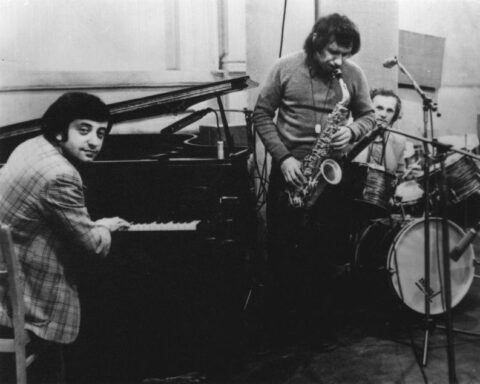I am often asked by musicians how to approach journalists to get interviewed or reviewed. Many believe that only by using an established,

well-connected public relations agency will they gain access to journalists but there are many who have built long-standing relationships with journalists by approaching them directly, and this essay explains how best to do so.
Of course, agents and PR companies have a lot of connections, but as far as journalists are concerned the personal approach can work. The value of getting noticed by a reputable journalist and having a piece about you published on a reputable site or in a physical magazine is immeasurable and there is a certain kudos that goes with being interviewed by a good journalist.
TEN TAKEAWAYS
1) Check the journalist writes about the kind of music you make.
2) Read and get familiar with their work and style of writing
3) Comment on their work when you connect and say why you have approached them.
4) Give them good information and refer them to useful sites for more.
5) Be concise and brief, but ensure the email gives a comprehensive introduction. Limit it to two or three paragraphs.
6) Give the five Ws – who, what, when, where, why
7) Create an engaging subject line
8) Be professional
9) React promptly if they show an interest
10) Listen to what they need and provide everything they need to create an outstanding interview or review.
Whether an interview or a review, well-written articles offer artists opportunities to lift quotes for their web pages and PR campaigns to augment their profiles. Most notice a spike in sales after a good review, which shows the world that an independent journalist noticed you.
A little information.
Before diving headlong into your campaign to get journalists’ attention, understand a few things.
There is a difference between a blog and a music column. Generally, a blog is run by one or two people. It may run interviews, reviews, and interesting articles, but the content is limited by the time the authors have to devote to the site, the quality of the writers, and the taste of just one or two people. Some blogs are very good, others not so much. On the other hand, online platforms’ music columns have many contributors who will have been chosen because of the quality of their writing, their knowledge of the type of music the column specializes in, and their popularity.
Most journalists writing for online sites do not get paid by the site. The sites are often run by enthusiasts who make enough from advertising to keep the site up, but there is no money to pay contributors. However, journalists writing for these columns often write professionally for other publications and online sites allow them to indulge a passion for a particular sub-genre. They do not have quite the same editorial constraints as in their professional work. They still write to professional quality, though. Engaging with the right journalists on these columns can lift a musician’s public profile hugely because these writers get readers.
Critics and reviewers are lumped together under the term ‘reviewer,’ but there is a difference. A reviewer writes about the music they hear, concerts they attend, performance, style, artistry, and so on; they write descriptively. A critic will also compare music with historical releases, place it within a historical timeline, contextualize it. It is worth checking journalists’ sites to see how they describe themselves.
The most likely place for your first review or interview is a local magazine or an online site, so this article concentrates on these. If you are aiming for a physical magazine, lead times might be longer, and you should check out their guidelines and how to approach them because they vary.
There are essentially three parts to working with jazz journalists. These are i) preparation, ii) approaching, and iii) collaboration.
Preparation
Preparation requires diligence, planning, and research. Begin way ahead of your release. Aim to get material to potential journalists at least six to eight weeks before your release date. Allow a three-month window prior to your release for publication of coverage.
Journalists love being the first to discover a new musician; they love news, so give them some. Think of you and your music as a product. Your job is to get someone interested enough to write about this product – someone with influence who can, in effect, help market you. Even if you have never been written about before, you have some information to give.
You know the release date; you know the label if you have one; you know your live dates and venues in the near future. You know the kind of music you create and who you play with. You also understand what drives you, how you write, and so on. Write all this down and what makes your music different, important, and worthy of journalistic interest. Don’t be modest; it can feel odd promoting yourself, but no journalist can write about what they don’t know, so you must have information available and accessible.
Consider what you would like to accomplish. Do you want your work reviewed? Would you like an interview so you can introduce yourself and your music to a broader audience? How are you going to get this?
Next, consider what a journalist needs. Few journalists will wade through pages and pages to find information. They will have limited time so they need information which is easy to find. Many times, I have been interested in reviewing a musician who has approached me only to be directed to their website which is full of irrelevant information. Make it easy for us to find information. Make your site navigable and engaging.
Everything about you should speak quality, attention to detail, and professionalism. Use high-quality photographs on your website and press release. Visual images are incredibly important, so employ a professional photographer if you can. If you are making videos, they should be high quality and not ones made on your friend’s mobile phone.
Next, create an outstanding press release. This should include a brief biography and information about the release. Keep the biography brief but include essential things like your training, experience, who you worked with, venues you played. If you have won awards, list them. Put down the information from your list made earlier. This is your sales pitch.
Are you working on a new initiative, a new educational project, or working with a major funding organization? Is a tour planned? Are you trying something not done before? All these facts can intrigue a journalist. Put them clearly and concisely in your press release.
Next, check everything for grammar and punctuation. Few journalists will read a poorly written biography or press release. It shows little respect for the reader or attention to detail. Imagine you are seeing the press release for the first time. Is everything a journalist needs there? In short, make note-taking easy for the journalist because these notes, along with the information you provide otherwise, will form the basis of most reviews and interviews.
Next, think about who to approach. Sending your information to a massive list, including every jazz journalist you find, is not a good approach. Firstly, you may find journalists interested more in their exposure than your music. They see your music as an opportunity to produce another review for their blog. You may even get asked for a fee. Few musicians realize this, but there are ‘reviewers’ who charge different rates for a 5,4 or 3-star review, and the reviews they produce are not worth a read for the discerning music fan. [Ed. note: The JJA does not condone charging musicians, producers or labels for reviews.]
Make sure the journalists you choose write about your kind of music. Find music columns that carry interviews and reviews online or buy physical copies of the magazines.
Read, read and read again. Check who reviews what kind of music. Find musicians who make music similar to yours and see who writes about them. Does the review portray the music well? Does the writer listen to every track and write about details they hear in the music? Are sales links included? If you had a choice, which of the journalists whose work you read would you like to interview or review you? You have a choice in this, too.
Make a list of the journalists you think would be interested in your music. Where do they write? Do they write for other publications than the one you have read? Are they perhaps authors as well? Make notes against each one. You will find certain journalists stand out as suited to your work by doing this. Only approach journalists if your music fits the kind they write about and the columns or magazine they write for. From your point of view, you want to work with a journalist who gets your work, a journalist who is also a fan of your kind of music. You wouldn’t send heavy metal to an opera critic, so don’t send cool jazz to a free jazz reviewer.
You should follow suitable journalists and engage with the community if you use social media. Check posts of similar artists and journalists you want to connect with. Who and what are they writing about? Keep your posts on all platforms respectful, polite, and professional.
The approach
The best approach is by email. Sending a direct message on a social media platform shows little preparation on the artist’s part. An email takes a pitch away from a public platform, immediately making communication just a little more personal and direct.
The opening line of your email can be crucial. Adopt a formal approach initially. First names can come later if the journalist wishes but open with their title and name, so ‘Dear Mr. Smith’ is okay. It also demonstrates you know if they are male or female. I get a lot of ‘Dear Mr. Stein’ or ‘Dear Sir,’ which immediately tells me the musician has not checked out my posts or reviews.
Then, in a short and straightforward paragraph, or two, introduce yourself and ask for an interview or review.
In the paragraph should be who you are, what you want, the type of music you create, your discography if you have released music before. If you are talking about a release, add the release date, a purchase link, a track-by-track personnel list, a high-quality cover shot, and where more information can be found. This simple approach will either interest the reviewer or not. Remember the 5Ws – Who, What, When, Where and Why. Add a brief comment or two on where you have read their work and something you found interesting – this shows you have done your homework before approaching.
Add a link to your music – that way the journalist can listen and decide if the music suits them and if they have somewhere to place an interview with you or a review of the music.
It is tempting to add lots of detail but don’t. Keep to one or two paragraphs and a link to your website and music at this stage – let the journalist decide if the music is likely to interest them. A wall of information, links, and background detail is something a journalist will not work through if they have never heard of you. Concise, well-crafted emails containing all the information a journalist needs to decide if they want to listen to the music or connect with you as an artist work best and show the journalist how organized and professional you are.
Then wait. This can be the most challenging part, but allow the journalist to decide if your music is something they want to know more about. Give it a week or so, and then send a gentle reminder but if you get nothing, move to the next journalist on your list. Understand that if you do not get a reply, it is not because the journalist is rude. They may have professional and personal commitments, be taking a break. It will not be personal. They are under no obligation to respond to every approach.
Even if a journalist turns down your first approach or does not reply, remaining professional can lead to future collaboration, so nurture and respect relationships.
Some recommended sites
Jazz views www.jazzviews.net
All About Jazz All About Jazz Music, Musicians, Bands & Albums
Something Else Reviews Something Else! – Tired of the same old? (somethingelsereviews.com)
Free Jazz Collective The Free Jazz Collective (freejazzblog.org)
Innerviews Innerviews: Music Without Borders
Platinum Minds Platinummind.net – Music. Photos. Blog Interviews.
New York Jazz City Record The New York City Jazz Record (nycjazzrecord.com)
DownBeat.com
JazzIz.com
JazzTimes.com
Point of Departure an online music journal
Working with a journalist
A positive response can be incredibly uplifting. Someone you respect and whose work you know is showing an interest in your work. Now comes more work – usually, work which is rewarding.
An interested journalist will ask for more information. This may be questions about you or your band, the music, details about past work – it can be anything really. Typically they ask about what inspires you, who influences your playing, perhaps how you write, and where. Try to answer as fully as possible without getting too personal. You may be asked for a quote. If so, give a considered quote, not just the first thing which comes off the top of your head. Give them what they need to create an in-depth interview. Remember, you are selling a product – you and your music.
With your answers, now add more information if you have it. More links to videos, give concert dates or projects you are working on for the future.
If the journalist decides to interview you, arrange a time and method and stick to this. Keep in mind that they are giving you their time and attention, but they do not have endless hours to allocate. Answer questions honestly, as thoroughly as you can. A journalist may ask for something unique – I often ask for a memorable quote. For the journalist, this demonstrates they have directly connected with the artist who respects them enough to offer something special. Do not then repeat this ‘unique quote’ in another interview.
Then comes more waiting. It can take days or weeks before a journalist has written their piece. Allow for this – it’s why early preparation is good. Usually reviews and interviews are published close to release dates to take advantage of the buzz created around a new discovery.
Once the review is published, read it. Share the review, say positive things about the journalist, keep things professional and friendly. Always go back to the reviewer and thank them, even if it is not quite the review you were expecting.
Remember: For a journalist, discovering new music, musicians and topics of interest to the broader jazz community is why they write. As a musician you create the music and provide the information; they help package it for consumers. Working with a professional jazz journalist is different from having your mate write a review on social media or their website. Online and physical magazines are widely read, written by professionals or writers respected in their field, and high-quality reads. Good articles will earn the writer kudos and respect, especially if you turn out to be the next megastar and they got to interview you first. So it works both ways.
In my experience, a musician’s approach tells me a lot about them, their understanding of marketing and their desire to work for exposure. I have musicians who only send releases to me now, and I understand that it costs.
One musician told me, “You are the only journalist I work getting review copies to. Shall I tell you how many journalists and bloggers keep begging for review copies every week? But I found your texts and approach interesting and thought it would be important to get you the records. It is expensive for the labels to send review copies and for me, too, and I’m losing royalties if too many copies go for review. I talk to musicians about you, that you are an independent journalist, doing your thing, no matter what, and writing intelligent texts and reviews that mean something. My view on this will not change.”
This message only came after working with the artist for several years. Their initial approach to me was direct, professional, courteous and concise.
It is a competitive world. The canny musician with the right approach – and the best music – will gain respect and acclaim, with the help of good journalists behind them.
Sammy Stein is a reviewer and author of All That’s Jazz, Women In Jazz, Gender Disparity in UK Jazz, In Their Own Words and the upcoming Jazz Uncovered. She is the JJA’s International Editor.





